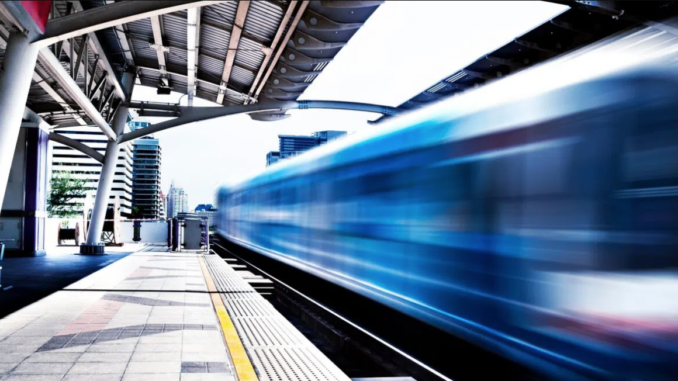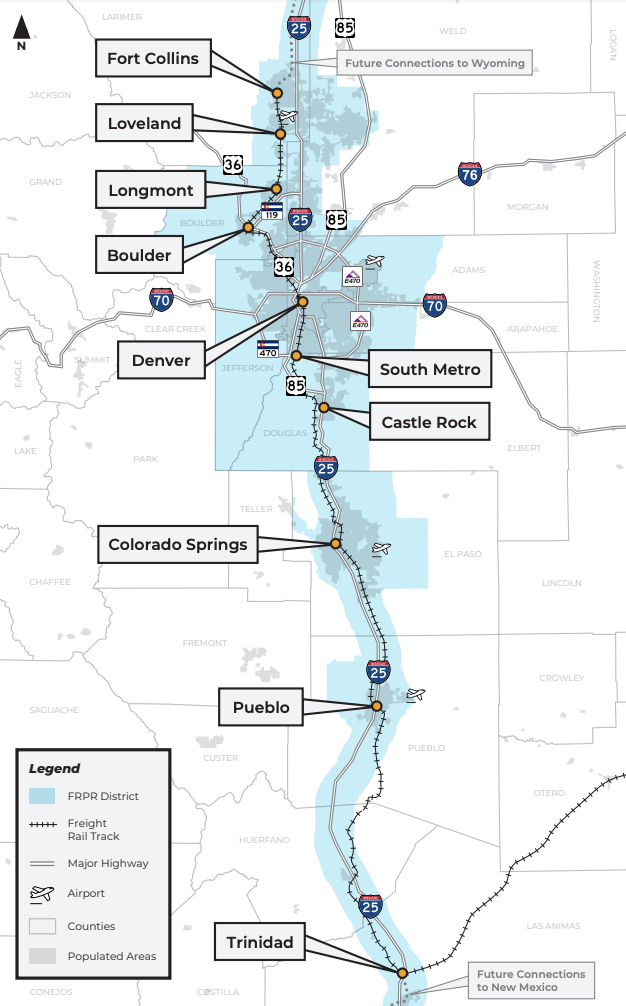
By Blaine Howerton | North Forty News
On December 1, 2023, the Colorado Department of Transportation (CDOT) shared news that it is exploring the availability of rail cars and locomotives to serve a rail line from Denver to Craig.
The department has issued a “request for information” to train equipment manufacturers and vendors on what fleet options are available for rolling stock — otherwise known as train cars and locomotives. Companies have 45 days to respond.
CDOT’s request for information is not a solicitation for bids and is not meant to result in a contract or order for equipment. Rather, it is an effort to understand what rolling stock might be available for mountain rail service.
“Let’s get rolling to provide more transportation options for Coloradans and visitors who want to explore, live and work in our world-class mountain communities and local economies. I look forward to the results to help make convenient mountain rail a reality,” said Governor Jared Polis.
“This is an important first step to understanding what technology is on the market that could meet the needs of mountain conditions,” said CDOT Executive Director Shoshana Lew. “We’re interested in factors like cost, safety technology, reliability and the use of energy efficiency options and clean power.”
The vision for mountain rail became a real possibility in recent months because of developments that include dramatically decreased coal train traffic on Union Pacific rail lines, creating a new transit opportunity for Colorado and an opportunity for UP to host more passenger rail on its mountain lines. UP lines already serve the California Zephyr and Winter Park ski trains, but there is capacity for more passenger service, including from Denver to Steamboat Springs, Hayden and Craig.
The other major precipitating event was Congress making $66 billion for passenger rail available through the Infrastructure Investment and Jobs Act. Because the Denver-to-Craig service would only require minimal track and safety improvements, CDOT is hoping that the mountain rail project would be an attractive candidate for federal funding.
Meanwhile, the Colorado Transportation Commission has approved $5 million in state funding for CDOT to study the mountain rail route as well as examine enhancing bus service statewide. This study will help CDOT determine how much ridership the line would have, how frequently trains should run, where stations should be and what operating and construction costs might look like.
The 191-mile Denver-to-Craig route has major advantages in that the rail line is already built and essentially would just need some safety and capacity improvements. This means major cost savings compared to a project where an entirely new rail line would be needed.
CDOT has asked train manufacturers to show whether they have locomotives and train cars that can handle the steep grades, high altitude and sometimes low temperatures of the Denver-to-Craig route. Train cars should carry 200 passengers and have “comfortable and upscale furnishings, including tables at facing seats and not more than 2×2 seat configuration.”
Further, planning and discussions of a passenger rail line from Wyoming to New Mexico are ramping up through the Front Range Passenger Rail (FRPR) District, led by a new government agency with the mission to design, finance, construct, operate, and maintain a new passenger rail system along the Front Range.

The organization plans to run the first trains from Fort Collins to Trinidad within 10-15 years, then expand into Wyoming and New Mexico afterward.
As communities grow, a new passenger train will connect Front Range Coloradans to opportunities, adventure, and each other. Are you ready to leave delays and heavy traffic behind?
We are too, so we’re planning for a future of safe, reliable, and climate-conscious travel.
-FRPR website at ridethefrontrange.com
On December 6, 2023, Governor Polis issued a statement applauding the Biden administration for including Front Range Rail in the Bipartisan Infrastructure Law’s Corridor ID Program.
“Coloradans want Front Range Rail, and I’ve heard firsthand from people in Pueblo, Fort Collins, and from across our state that they want more options to get where they need to go efficiently and affordably. Front Range Passenger Rail will modernize our transit system, save people money, and support jobs and housing across our state. I applaud the Department of Transportation and the Biden administration for securing and providing this funding, and for recognizing the need for this service and the promise to get it done soon. Colorado’s participation in the new Corridor Identification program shows that this project is ready to move forward,” said Colorado Governor Polis.
The Bipartisan Infrastructure Law contained $66 billion in funding for passenger rail developments. The Corridor Identification Development Plan is the first federal step in identifying projects nationwide.
The Corridor Identification and Development (Corridor ID) Program is a comprehensive intercity passenger rail planning and development program that will help guide intercity passenger rail development throughout the country and create a pipeline of intercity passenger rail projects ready for implementation.
Throughout Colorado, many of the rail lines are already in place. Modifications will need funding to make them suitable for passengers.
Support Northern Colorado Journalism
Show your support for North Forty News by helping us produce more content. It's a kind and simple gesture that will help us continue to bring more content to you.
BONUS - Donors get a link in their receipt to sign up for our once-per-week instant text messaging alert. Get your e-copy of North Forty News the moment it is released!
Click to Donate
